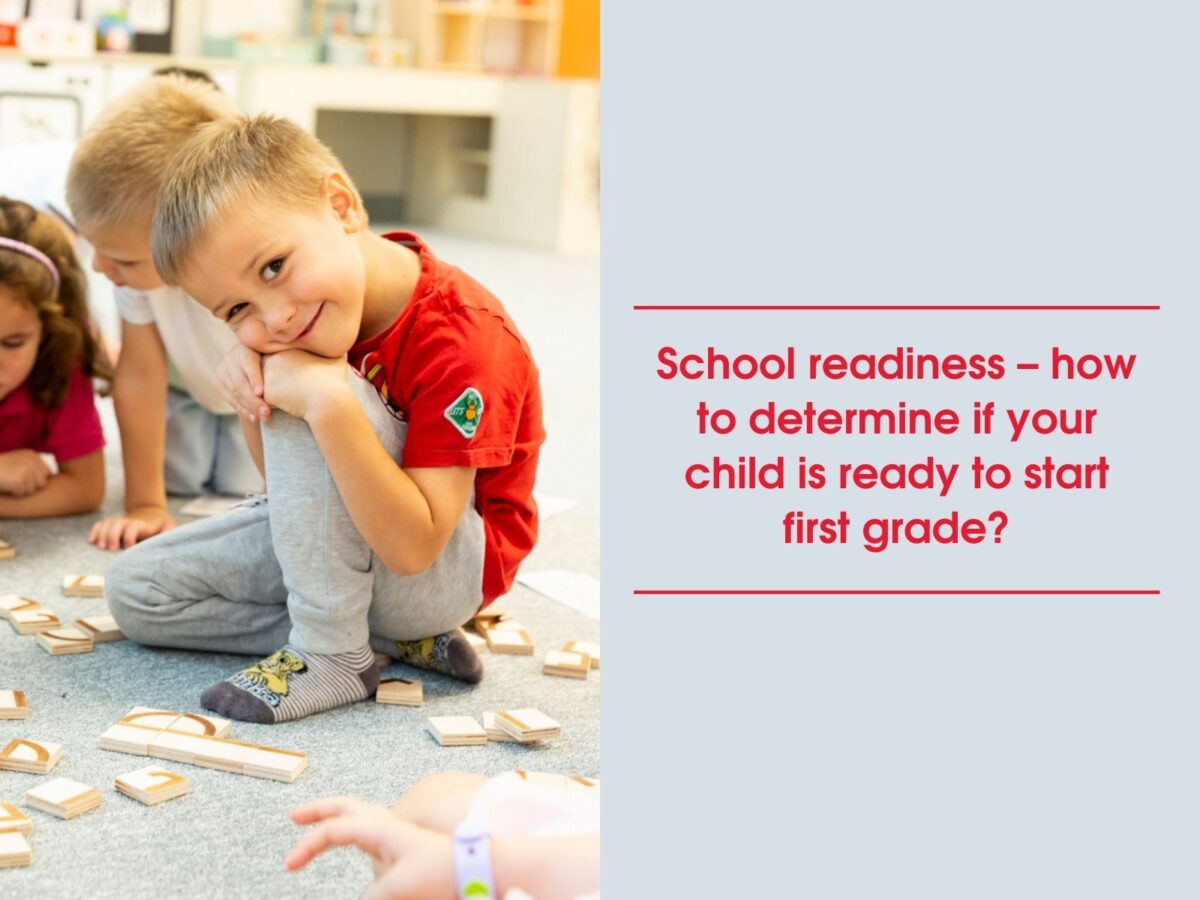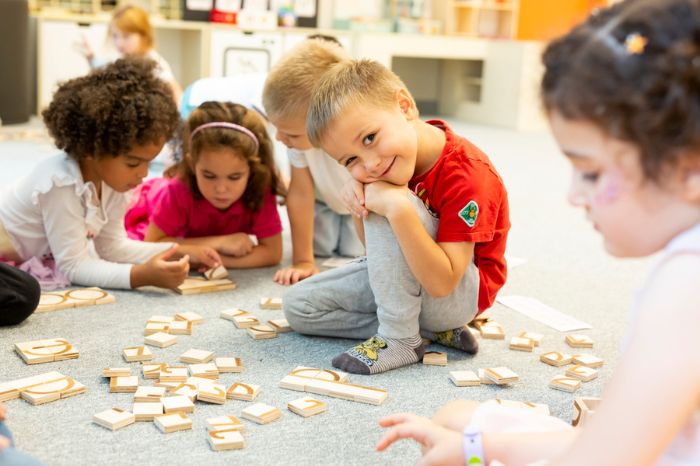School readiness – how to recognize if your child is ready to start first grade?

Starting school in first grade is a significant milestone in a child’s life. The transition from preschool to primary school involves a major change, both emotionally and intellectually. Parents often wonder if their child is ready for this step. How can school readiness be recognized? School readiness is a topic that raises many questions, so it is worth taking a closer look at the factors that determine whether a child is prepared to start school.

The new school year is approaching, but what exactly is school readiness?
School readiness encompasses various aspects of a child’s development that enable them to succeed in school. It is not just about intellectual abilities, but also emotional, social, and physical skills. A child ready for school can function in a new environment, manage emotions, cooperate with peers and teachers, and focus on educational tasks. The level of development of a child starting the next stage of education affects their basic school skills and how they apply them in a new environment.
Who assesses a child’s school readiness?
Assessing a child’s school readiness is a process that requires the involvement of both parents and specialists. Preschools often conduct school readiness assessments, analyzing the child’s development in various areas. Teachers, psychologists, and educators assess emotional development, language skills, physical growth, and basic school competencies. Parental observation is also crucial in recognizing progress and potential challenges. The final decision to start first grade should be based on a comprehensive evaluation of school readiness.
How to recognize school readiness in a child?
Identifying school readiness requires observing the child’s daily behavior and analyzing various aspects of development. A child ready for school can focus for longer periods, shows interest in learning, listens attentively, asks questions, and tries to solve simple tasks independently. The ability to manage emotions, build relationships with peers, and follow rules are key indicators of school readiness. Physical maturity is also essential – the child should have developed fine motor skills, such as holding a pencil, drawing simple shapes, or buttoning clothes. Parents can support their children in achieving school maturity by engaging in educational activities, encouraging independence, and building confidence before starting school.
Key aspects of school readiness – which areas of development influence achieving school maturity?
1. Emotional maturity
A child’s emotional development is one of the most crucial aspects of school readiness. A child ready for school can manage emotions such as anxiety, anger, or frustration. They can handle separation from parents and respond appropriately to situations, such as not experiencing excessive distress when saying goodbye in the morning. Observing whether the child can make friends and feel comfortable in a new environment is essential. Proper emotional development enables children to express their needs and adapt to new rules and routines, which are key for school maturity.
2. Social maturity
A socially mature child can cooperate with peers and teachers. They can follow simple rules, such as waiting their turn, sharing toys, and listening to others. Functioning in a group, resolving conflicts, and building healthy relationships with classmates are crucial skills for school readiness. The ability to share the teacher’s attention with other children and engage in teamwork are vital elements of school readiness.
At KIDS&Co. preschools, we support children’s emotional and social development – learn more.
3. Cognitive maturity
Achieving school readiness is closely related to a child’s intellectual abilities. This refers to their capacity to take on academic challenges such as focusing on tasks, understanding instructions, and following directions. A child ready for school should have basic cognitive skills, such as recognizing letters and numbers, counting to 10, and basic spatial awareness (e.g., distinguishing left from right). Imagination and creativity are also crucial in learning through play and exploration.
4. Physical maturity
Proper physical development refers to the child’s ability to meet the physical demands of school, such as sitting for long periods, walking between classes, and performing simple manual tasks. A child ready for school should be able to put on shoes, dress independently, and use writing tools such as pencils, crayons, and scissors. Developing fine motor skills at this stage is essential for learning in first grade.
How to support your child’s school readiness?
Parents play a crucial role in preparing their child for school. Establishing certain routines can help ease the transition. Here are some tips for supporting your child’s development:
- Support emotional development – talk to your child about school, explain what to expect, and listen to their concerns. Visiting the school before the start of classes can help them feel more comfortable in the new environment.
- Encourage social skills – engage your child in group activities to help them learn cooperation and rule-following. Participating in group activities prepares children for teamwork.
- Develop cognitive skills – read books together, discuss various topics, and engage in educational games. Simple activities like drawing, painting, and solving puzzles help prepare your child for school.
- Focus on physical development – ensure your child has a healthy lifestyle with enough sleep, exercise, and a nutritious diet. Outdoor play helps develop coordination and stamina.
Compulsory schooling for children
According to Polish law, compulsory schooling begins at age 7. Based on the Education Law Act of December 14, 2016, every child turning 7 in a given calendar year is required to start first grade in primary school.
Deferring Compulsory Schooling
Not every child reaches school readiness at the same time. In cases where an assessment of school readiness indicates difficulties in one or more areas of a child’s development, parents can opt for deferring compulsory schooling. This option applies to children who have reached the age of 6. According to the Education Law Act of December 14, 2016, the deferral of compulsory schooling can be granted by the school principal at the request of the child’s parents or legal guardians. This request should be justified with appropriate reasoning. Deferral is possible in cases of:
- Delayed development – if the child has difficulties in physical, psychological, or social development that prevent them from fully participating in primary school education.
- Health issues – if the child has medical conditions that require specialized care or rehabilitation, making regular schooling difficult.
Based on specialist opinions, the principal issues a deferral decision, which is valid for one year. Deferring school entry gives the child additional time to develop and prepare for the demands of primary school, which may positively impact their future educational success. If the child is not ready to start school, they can continue attending preschool for another year.
Conclusion
School readiness is not just about intellectual abilities but also emotional, social, and physical development. All these aspects enable a child to begin their school education and achieve success. It is a continuous process, and parents can support their child by paying attention to various areas of their development. It is important to consider school readiness not only in terms of academic skills but also emotional, social, and physical capabilities, which are equally important for school success.
Learn more about the KIDS&Co. preschools and nurseries program. Our facilities are located in the following cities:
- private preschools and nurseries in Warsaw
- private preschools and nurseries in Wrocław
- private preschools and nurseries in Gdańsk
- private preschools and nurseries in Łódź
- private preschools and nurseries in Kraków
- private preschools and nurseries in Katowice
- private preschools and nurseries in Poznań
- private preschools and nurseries in Suwałki
- private preschools and nurseries in Ostrów Mazowiecka
Let’s meet!
We invite all of you to an individual meeting with the headteacher. This will be a great opportunity to find out about our educational offer, ask questions, and visit the kindergarten. You can book one visit for a given day.












